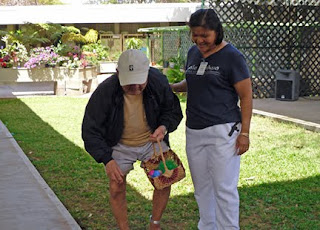Introduction to Luana
View more presentations from Hale Makua Health Services.



Submitted by Teresa Lopes, Activities Director
 Yesterday afternoon the residents and staff at Hale Makua Wailuku held Hale Makua Idol, a fundraiser for the annual Visitor Industry Charity Walk. Contestants sang their hearts out for the audience and judges, while a few audience members danced along to the tunes and held up signs for their favorite contestants.
Yesterday afternoon the residents and staff at Hale Makua Wailuku held Hale Makua Idol, a fundraiser for the annual Visitor Industry Charity Walk. Contestants sang their hearts out for the audience and judges, while a few audience members danced along to the tunes and held up signs for their favorite contestants.





 In developing the curriculum for training all Hale Makua Health Services' employees the Luana Core Team thought it would be a great idea to have something that would reinforce the Eden Principles. We threw around ideas like having a quick reference card or a "flash card" for each principle, but those things didn't really seem realistic for staff to carry around with them. Plus we wanted something a little more fun, something that would not only serve as a reminder and reinforcement of Luana, but would also instill pride. Someone came up with the idea of having a tee shirt with the three plagues of loneliness, helplessness and boredom. While that message was quick and to the point, we wanted something more positive. In the end we decided on a message with the antidotes to the three plagues: companionship, giving & receiving care, and variety & spontaneity. The shirts will be given to each resident, employee, volunteer, and resident family member that completes the introductory Luana education. If you want to see what the tee shirt design looks like, you'll have to take the class!
In developing the curriculum for training all Hale Makua Health Services' employees the Luana Core Team thought it would be a great idea to have something that would reinforce the Eden Principles. We threw around ideas like having a quick reference card or a "flash card" for each principle, but those things didn't really seem realistic for staff to carry around with them. Plus we wanted something a little more fun, something that would not only serve as a reminder and reinforcement of Luana, but would also instill pride. Someone came up with the idea of having a tee shirt with the three plagues of loneliness, helplessness and boredom. While that message was quick and to the point, we wanted something more positive. In the end we decided on a message with the antidotes to the three plagues: companionship, giving & receiving care, and variety & spontaneity. The shirts will be given to each resident, employee, volunteer, and resident family member that completes the introductory Luana education. If you want to see what the tee shirt design looks like, you'll have to take the class!

